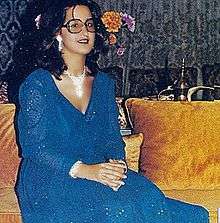Aziza Jalal
| Aziza Jalal | |
|---|---|
 Aziza Jalal | |
| Background information | |
| Native name | عزيزة محمد جلال |
| Birth name | Aziza Mohamed Jalal |
| Born |
15 December 1958 Meknès, Morocco |
| Genres | Arabic music, Egyptian pop, Moroccan pop. |
| Occupation(s) | Singer, record producer |
| Years active | 1975–1985 |
| Labels |
Mazzika Alam El Phan Sawt El Hob Sawt El Phan |
| Website | Aziza Jalal |
Aziza Jalal (Arabic: عزيزة جلال, Aziza Jalal; born 15 December 1958)[1] is a Moroccan former Arabic pop singer.
Career
Aziza Jalal is an iconic Arabic singer from Morocco.[2]
In a singing career that lasted from 1975-1985, Aziza Jalal became a popular classical singers across the Arab world before deciding to give up the artistic scene for a life of piety with a Saudi husband. She was known to be King Hassan II of Morocco's favourite signer, and often appeared on Moroccan television and at state occasions singing nationalistic, pan-Arab, and Islamic-themed material.[3]
Retirement
In 1985, Aziza Jalal chose to leave the stage. Aziza Jalal married a Saudi businessman who asked her to give up her career.[4]
Discography
Studio albums
| Song | الأغاني |
|---|---|
| Halakti Ayouni Hna W Hnak | حلقت عيوني هنا وهناك |
| Ahila Al Maghreb | عاهل المغرب |
| Batala Al Qodss | بطل القدس |
| Ya Laylo Toul | ياليـل طول |
| Al Aido Ada | العيد عاد |
| Annouro Mawsolo | النور موصول |
| Yorani Liarchika | يغن لعرشك |
| Min Koli Dakit Alb | من كل دقة قلب |
| Sayidi Ya Sid Sadati | سيدي ياسيد ساداتي |
| Gazayil Follah | غزيل فله |
| Ya Shoue | ياشوق هزني هوى الشوق |
| Ella Aweel Matkabilna | إلا أول ماتقابلنا |
| Howa El Hobi Liaba | هو الحب لعبه |
| Waltakayna | والتقينا |
| Zayi Manta | زي مانت |
| Minak Wi Eleek | منك واليك |
| Mestaniyak [5] | مستنياك |
| Min Haak Tiatibni | من حقك تعاتبني |
| Haramti El Hob | حرمت الحب عليه |
| Rouhi Feek | روحي فيك |
| Azzamzamiya | قصيدة الزمزمية |
| Mawlay | مولاي |
| Ghali Ya Hassan | غال ياحسن |
| Inta Omri | إنت عمري |
| Arouh Limin | أروح لمين |
| Al Atlal | الأطلال |
| Layali El Onss | ليالي الأنس |
| Youmi El Massira | ِمِن يِنسى يوم المسيرة |
| Official song of the Pan Arab Games 1985 | 1985 الأغنية الرسمية لإفتتاح الألعاب العربية |
| Man Ana | من أنا؟ |
References
- ↑ Aziza Galal sur alrai.com, consulté le 15 août 2014.
- ↑ "عزيزة جلال.. العفوية والأسلوب النوذجي الفاخر!". جريدة الرياض (in Arabic). Retrieved 2018-03-19.
- ↑ "Pop Culture in North Africa and the Middle East: Entertainment and Society around the World". publisher.abc-clio.com. Retrieved 2018-03-19.
- ↑ ""يحيى يعيش" وpasse-partout وManipulation". الأخبار (in Arabic). Retrieved 2018-03-19.
- ↑ عزيزة جلال - أشهر من جلست على كرسي الانتظار
Further reading
- Pop Culture in North Africa and the Middle East: Entertainment and Society around the World, by Andrew Hammond, Series: Entertainment and Society around the World, 2017 - 319 pages. ISBN 1440833834, 978-1440833830
- الرماد والموسيقى: حفريات في ذاكرة غنائية عربية, واصل، أحمد, دار الفرابي، 2009 - ISBN 9953713340, 9789953713342-
- Alif bāʼ, Volume 10, by Karīm Irāqī, Publisher, Dār al-Jamāhīr lil-Ṣiḥāfah, 1977, Indiana University - Digitized on 16 July 2010
- Iraqi Maqam voices of women: an analytical study of the critical technical experience of Iraqi women in singing Almqami, by Hussein Azami, by Hussein Azami, AIRP, 2005 - 316 pages. ISBN 9953366772, 9789953366777
- Songs and stories, by Karīm Irāqī, by Karīm Irāqī, Company Whites of Arts and Letters, Volume 1, Aghānī wa-ḥikāyātuhā, Karīm ʻIrāqī -
- La condition de la femme au Maroc, by Abderrazak Moulay Rchid, Volume 33 of Collection de la Faculté des sciences juridiques, économiques et sociales: Série de langue française Issue 33 of Collection: Série de langue française, Jamiʻat Muḥammad V. Kullīyat al-Huqūq wa-al-ʻUlūm al-Iqtisādiyah wa-al-Siyāsiyah, Editions de la Faculté des sciences juridiques, économiques, et sociales de Rabat, 1985 - . (in French)
This article is issued from
Wikipedia.
The text is licensed under Creative Commons - Attribution - Sharealike.
Additional terms may apply for the media files.